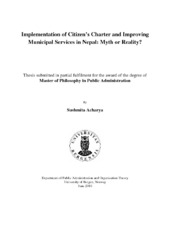| dc.description.abstract | The citizen's charter, as one of the quality assurance strategies in the public sector put forward by New Public Management theorists, has been introduced in Nepal with the view of improving the quality of governmental service delivery, increasing the level of citizens' satisfaction and enhancing efficiency of bureaucratic apparatus at the local level. This study aims to understand the level of citizens' satisfaction with municipal services and thereby examines their perception regarding the service quality after the implementation of CC. The study is based on nationwide survey conducted in the year 2008 under joint research project between University of Bergen, Norway and Tribhuvan University, Nepal where the data has been collected from 988 service users of 10 municipalities. The study followed the quantitative approach and analysis is carried out with statistical methods. Citizens' level of satisfaction was analyzed based on three independent variables namely (a) socio-economic background, (b) institutional performance and (c) institutional trust. The findings indicate that institutional trust is more influential to have impact on satisfaction with municipal services. Especially, the officials' responsiveness and friendliness to citizens are significant to explain relationship with the level of satisfaction with municipal services. In the institutional performance, cost of services has revealed negative correlation, .i.e. more costly the services lesser is the extent of satisfaction. Within socioeconomic background, the level of education has significant but inverse impact on level of satisfaction i.e. higher the level of education lower is the level of satisfaction with municipal services. While the other identity based variables like gender, economic class and family size are less significant. The concluding remark is that citizen's charter is not a myth for improving the service quality at the local level rather it is a realistic approach to improve the quality, efficiency, and productivity of municipal service provisions. | en_US |
